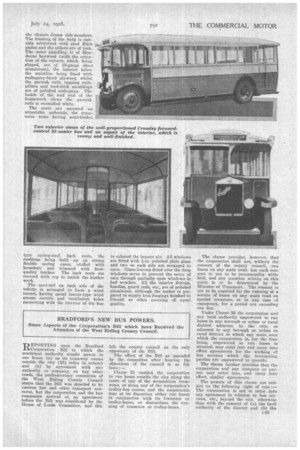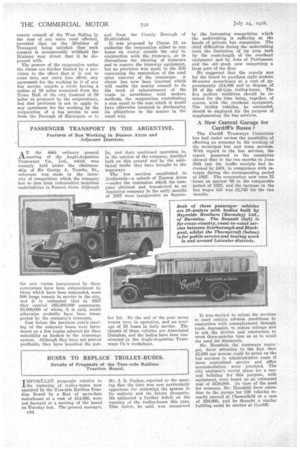BRADFORD'S NEW BUS POWERS.
Page 65

Page 66

If you've noticed an error in this article please click here to report it so we can fix it.
Some Aspects of the Corporation's Bill which have Received the Attention of the West Riding County Council.
REPORTING upon the Bradford Corporation Bill in which the municipal authority sought power to run buses (a) on its tramway routes outside the city (131 miles in extent) and (b) by agreement with any authority or company, on any other roads, the parliamentary committee of the West Riding County Council states that the Bill was objected to by various bus and other transport concerns, but the corporation and the bus companies arrived at an agreement before the Bill was' considered by the House of Lords Committee, and this
left the county council as the only opponents of the Bill.
The effect of the Bill as amended by the committee after hearing the objections of the council is as follows:— Clause 21 enables the corporation to run buses outside the City along the route of any of the corporation tramways, or along any of the corporation's trolley-bus routes, and the corporation may at its discretion either run buses in conjunction with its tramcars or trolley-buses, or discontinue the running of tramcars or trolley-buses.
The clause provides, however, that the corporation shall not, without the consent of the county council, rue buses on any main road, but such consent is not to be unreasonably withheld, and any question arising on this point is to be determined by the Minister of Transport. The consent is not to be required for the running of a service of bases on any main road on special occasions, or in any ease of emergency, for a period not exceeding one day.
Under Clause 26 the corporation and any local authority empowered to run buses in any borough or urban or rural district adjacent to the city, or adjacent to any borough or urban or rural district in which any route over which the corporation is, for the time being, empowered to run buses is situated, may enter into and carry into effect agreements for the working of bus services which the contracting parties are empowered to provide.
The clause further provides that the corporation and any company or person may enter into, and carry into effect, similar agreements.
The powers of this clause are subject to the following right of veto :— The corporation is not to enter into any agreement in relation to bus services, etc., beyond the city, otherwise than with the consent of (a) the local authority of the district and (b) the county council of the West Riding in the case of any main road affected, provided that on the Minister of Transport being satisfied that such consent is unreasonably withheld the Minister may direct that it be dispensed with.
The powers of the corporation under the clause are further limited by a provision to the effect that it is not to enter into, nor carry into effect, any agreement for the working by it of any bus service outside a circle having a radius of 10 miles measured from the Town Hall of the city (instead of 20 miles as proposed by the corporation), but that provision is not to apply to any agreement for the working by the corporation of a bus service to and from the Borough of Harrogate or to and from the County Borough of Huddersfield.
It was proposed by Clause 21 to authorize the corporation either to run buses on routes outside the city in conjunction with the tramcars, or to discontinue the running of tramcars And to remove the tramway equipment, but no provision was made in the Bill concerning the restoration of the road after removal of the tramways. A clause has now been inserted which will enable the county council to do the work of reinstatement of the roads in accordance with modern methods, the corporation contributing a sum equal to the cost which it would have otherwise incurred in discharging its ebligations in the matter in the usual way.












































































































